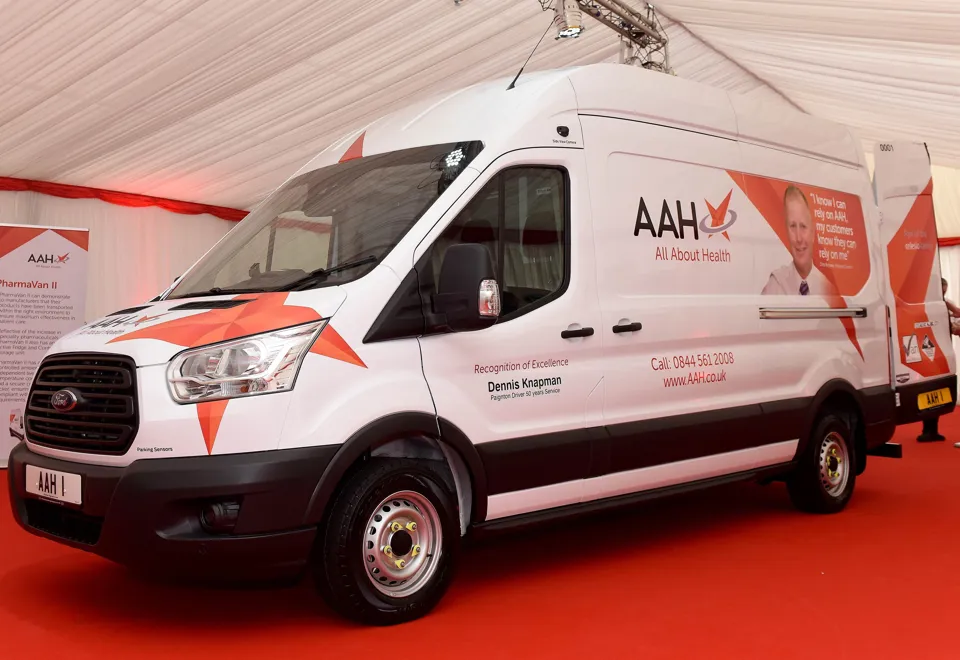AAH Pharmaceuticals has developed an innovative new van, in partnership with Ford and specialist conversion companies, which monitors the temperature of the fridge unit.
The company is now replacing its entire 896-strong fleet of specialist temperature controlled delivery vans after winning several major solus supply deals.
The UK wholesaler and distributor of pharmaceutical and healthcare products has initially ordered 340 new Ford Transit L3 H3s.
The remainder of its current Transit 300 fleet will be replaced as vehicles reach the end of their leasing contract.
The company’s PharmaVan II project to upgrade the fleet has taken 18 months to pull together and is the result of working with six suppliers, including Ford and specialist conversion companies.
Tony Percival, head of distribution at AAH Pharmaceuticals, said: “The Pharma I van met the requirements of the Medicines and Healthcare products Regulatory Agency (MHRA).
“But we wanted to go further and future proof our fleet.”
The vans have been developed in line with GDP 2013 guidelines, which Percival insists is best practice, rather than something mandated.
Although he wouldn’t say how much AAH invested in the project, he did say it was a “substantial amount”.
He said: “The manufacturers we won contracts for have a high sensitivity to the temperature their medicines are stored at and they need to be kept at a constant temperature in order to avoid any degradation in their effectiveness, so it was really important for us to invest in the technology with the fleet to provide confidence to the suppliers.”
The new vans are fitted with a Seven Eye telematics unit linked to an online portal, allowing drivers and managers to monitor the temperature of the fridge unit in the vans for the first time. AAH’s 15 warehouses can track temperature levels across the fleet and drivers can also access the information in the van.
Percival said: “Using the Seven Eye tracking technology, we can support whether temperatures have deviated and catch any problems with vehicles early.”
Martine Smith, distribution services manager for AAH parent company Celesio UK, said the temperature tracking helps with AAH’s paper trail too.
The company will be able to provide evidence to its customers or manufacturers partners that the medicines have been stored correctly in transit.
Smith is expecting to have up to 250 vehicles on stream before the end of March 2016 and the entire fleet will have the PharmaVan II upgrade by the start of 2018.
AAH operates a four-year/140,000-mile cycle on its van fleet, with vehicles leased through Arval. The fleet covers 26,500 deliveries, twice a day.
Drivers were surveyed during the development of the PharmaVan II to find out what would help them in their day-to-day operations.
As a result, each van is also fitted with inside, rear, forward, and two side cycle cameras for their security as well as reversing sensors, with a front mirror camera display to assist with reversing and manoeuvring.
Percival said: “Hopefully we’ve built enough flexibility into PharmaVan II that III will be a long way off, but we’re constantly looking at customer and patient demand and what we can do to meet those demands with the vehicles.”
The company has also signed up to the new Driver Certificate of Competence, commonly known as the driver passport, recently launched by the Freight Transport Association (FTA). It consists of eight topics, from vehicle security to safe and eco driving, and has been designed by members of the FTA Van Excellence Governance Group.
Transport and branch teams will also receive the training, providing them with the knowledge to support drivers.
Smith said the training will support best practice, reinforces AAH’s internal distribution and regulatory procedures and takes a proactive approach to risk management and post-incident management.



















Login to comment
Comments
No comments have been made yet.